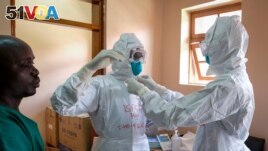21 October 2022
The World Health Organization (WHO) says it is preparing to deploy experimental Ebola vaccines to Uganda.
The WHO's representative in Uganda, Yonas Tegegn Woldemariam, said Wednesday the deployment would happen in about "two weeks."
The two vaccines being sent to the East African nation are still undergoing development. But they aim to target the Ebola version currently spreading in Uganda.

Doctors put on protective equipment as they prepare to visit a patient who was in contact with an Ebola victim, in the isolation section of Entebbe Regional Referral Hospital in Entebbe, Uganda Thursday, Oct. 20, 2022.AP Photo/Hajarah Nalwadda)
One vaccine was developed by a U.S.-based nonprofit, the Sabin Vaccine Institute. The other was developed by Britain's Oxford University and the Serum Institute in India.
"We are getting closer and closer to deploying vaccines," Woldemariam told The Associated Press. "This is just another tool that we are going to try."
Officials said health workers in Uganda were making final preparations to receive and give out the experimental vaccines.
Ebola is a virus that can cause severe bleeding and organ failure. In serious cases, it can lead to death. A version of Ebola that came from Sudan is currently spreading in Uganda.
So far, the virus has infected at least 60 people and killed 44 in Uganda, WHO officials said. Those numbers do not include people who likely died of Ebola before the latest outbreak was confirmed.
Uganda declared the outbreak on September 20. It happened in a rural farming community about 150 kilometers west of the capital, Kampala. Officials in the area have issued stay-at-home orders and other restrictions in an effort to contain virus spread.
Ebola is passed through contact with bodily fluids of a sick person or by infected materials. Symptoms can include high temperature, vomiting, diarrhea, muscle pain and bleeding.
The U.S. Centers for Disease Control and Prevention states that scientists do not know where the Ebola virus came from. But based on similar viruses, they believe it likely starts in "bats or non-human primates." Ugandan officials are still investigating the start of the current outbreak.
Uganda has already had several Ebola outbreaks, including one in 2000 that killed more than 200 people. An outbreak of Ebola that started in West Africa in 2014 killed more than 11,000 people.
Ebola was discovered in 1976 during two different outbreaks that happened at the same time in Sudan and the Democratic Republic of the Congo. The virus was first identified in a village in the Congo near the Ebola River and that is where it got its name.
I'm Bryan Lynn.
The Associated Press, Reuters and Agency France-Press reported this story. Bryan Lynn adapted the reports for VOA Learning English.
_______________________________________________________________
Words in This Story
primate – n. a member of the group of animals that includes monkeys and people
symptom - a change in the body or mind which indicates that a disease is present